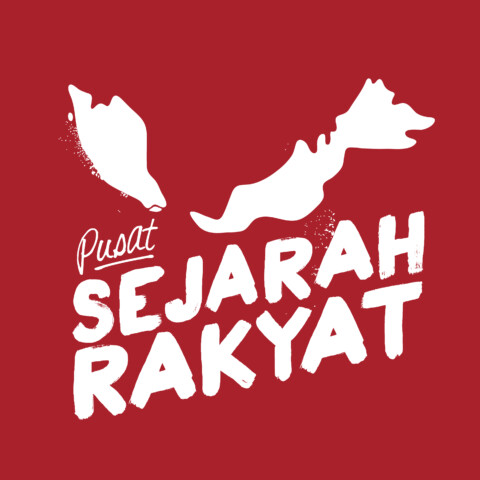Gengta Tan is a longtime paramedic who has been involved in more than 40 protests and played a crucial role in the Bersih protests’ medical services. His experience in various protests allowed him to serve as trainer and leader during a number of Bersih rallies.
*All photos were provided to us by Gengta Tan. The lower resolution of these photos were a byproduct of their time.
Tell us a bit about who you are, what it was like growing up, and your background.
My name is Tan Gengta. I’m originally from Perak, a small town called Teluk Intan. Chinese people would call it Anson. Growing up there involved a lot [of] school activities and especially white medic ambulance, [which] is how I [got] into medical roles during protests later. I’ve been joining since primary school and up to when I was an adult before [getting] married, I was still in it. After some time in white medic, I realised there are a lot of restrictions on what I can do so that’s why I had to become independent and work on my own.
During my college days, I actually joined and heard a lot of the Anwar Ibrahim cases in ‘97, ’98. That is the time that we all heard a lot of news and that is how I [got involved] in the activist [sphere] to find out what is actually happening. Because at the time, I believe a lot of [the] Chinese community, they would say this is not my problem. But this is our problem because as Malaysians, we need to be involved in our future as it is our community standpoint. So from 1998, I started [getting] involved in listening to those ceramah and getting involved in a lot of these gatherings as a medic. From there, we will know what is right and what is wrong.
[At] the time, we noticed that a lot of unnecessary and unpredictable cases were actually happening around. For example, you would have a lot of protesters coming out and you would have a lot of provocations coming out to disturb the peaceful assembly, [and] the only [thing] lacking is they [did] not have medical attention. That is the thing that [sparked] in my mind. They need a person [who] at least know how to [do] random first aid to [be] involved.
Can you tell us a bit about the first protest you’ve ever been to and your experience as a participant? Were you afraid or were you excited?
The first protest I’ve ever been to is the Anwar protest, I think. Reformasi time, I attended a lot but I [participated more seriously] in Anwar.
Of course you would be afraid because you are under a college or university [as a] student at that time. You were afraid that you will be the next Adam Adli, will be disingkirkan from your graduation or things like that. The thing [that] made me interested is a lot of my friends—not only Chinese, I have a lot of Malay friends—[would] tell me or share with me a lot of Anwar things. That made me want to know more [about] why people want to attack Anwar? Why people want to put him into jail? I [initially] had no interest in knowing about Anwar at the time, but [the situation] made me [realise that] in reality, people in power can put whoever [they want] into jail as long as they like. So I find it is not fair.
Then in 1998, I started listening to all the ceramah at the time. Sometimes, I find it very weird because there are very few Chinese present [and] I’m one of them. They will [give me a look and think] is this guy a spy from DAP or from Gerakan, because they never thought of Reformasi [as] strong at the time because it just started moving. [At that] time also, I’ve been involved in white medic and I do a lot of this duty in UMNO assemblies as an ambulance crew or things like that so that [started my involvement] in this kind of assembly. [At these] assemblies, a lot of [the] things you hear are nonsense. They will tell you oh, ini tanah siapa? Kita ketuanan siapa? They will tell you all these kinds of things, which you would say I’m also born in this country, what do you expect more? From that, it sparked in my mind: Now I know why you want to put somebody in jail. It’s because of some unfairness.
Can you think of any of the incidents in 1998? Would you consider any of those as protests you attended?
When they jailed Anwar for the first time, I was on duty with the ambulance crew with white medics.
Do you consider being a medic as participating in the protest?
As a medic, we have to be very neutral. We don’t side with left A, or right B, so we [were] very firm [on] who we are. We are medical, we are not supporting both sides. I just observe, see whatever things are happening and we will act accordingly.
So it’s fair to say that you don’t think of it as direct participation and you were just helping as a neutral party?
Yes, that’s correct. I think to stand as a neutral party [would] be much more transparent because we don’t want to let people from the A team think we are siding with B, and people from the B team to think we are siding with A. We are here as a medic and medic is supposed to be neutral, we cannot side with whoever that we want.
Were you involved in anything between Reformasi and the first and second BERSIH?
I think I have joined more than 30, 40 protests. That’s why if you ask the old generation like Arul from PSM and Maria Chin, Ambiga, I think most of them know me. They know this guy Gengta is a medic guy, and they always say yeah, you can trust him. [He can keep all the secrets]. Although sometimes I’ve been questioned by the police, but [there is never any] evidence that I have to surrender to them because a lot of things are not under my phone.
It does sound like the police eventually realised that you are not so neutral?
They only realised I’m not so neutral in BERSIH 3. Took them quite a while because up until BERSIH 2, I’m still involved as very neutral. In BERSIH 2, there is this high ranking police officer [who] asked me not to do this, not to do that, not to give random first aid to the person. So I say I don’t take orders from you even though your ranking is police. When I see there is a victim, [what] I see is a need for help [and] I have to be there. I also got a warning letter from my superintendents during my time with the white medic. I’ve been asked not to be involved in the next assembly [but it didn’t] stop me. I still come up as neutral. Even those days, they would look at me like hey, how come you’re not in your uniform? I say the superintendents do not allow me to stand in duty so I have to come plain clothed. I would come in black colour t-shirt. It’s like I was stationed with them but I want to have something different, so I make my own vest. Those kind of reflective, yellow vest with the medical logo velcro-sticked on behind to identify I’m a medical.
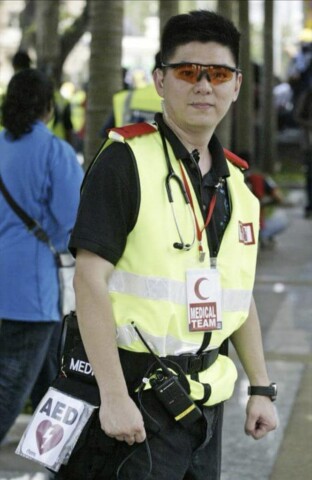
Gengta in his full paramedic uniform and gear.
When was the first time you had to do that as an independent?
BERSIH 2.
So all the way to your 30 plus protests, you go with white medic and they treat you as neutral? Nothing really out of the ordinary?
Yes, only BERSIH 2 we started [being] involved more [in] standing with the people. [Before], I [was] standing in between both parties as a neutral but after BERSIH 2, I stand with the people. Because I can see the unfairness, how [the protesters] were brutally beaten with batons. They would say the protesters fell by themselves. I say no, they did not fall by themselves. We can see from the injury how the wound [had] been caused, and because we [are] qualified first aiders, we can justify this is not a normal fall [where] you hurt yourself. This is if you’ve been brutally hit by an object like a baton, or this is a stepped wound onto the chest, onto the face. You can see because there is a shoe mark on the shirt or in the face. So from there, you know that this is very, very bad. I got one incident, BERSIH 3, I even shielded a person. A Malay guy [who] has been brutally beaten. I held [and] covered the person and I got kicked from the police as well. Then after that, another police came and said you cannot kick medic, so then they stopped. So that is also one of the incidents.
I think my name Gengta start popular [and] well-known is because of one of the incidents from the video [where I did] CPR during BERSIH 3. The person that I have saved, he’s still alive. He was saved during CPR. Because at the time, a lot of doctors were very gung ho, I want to help, I want to help, but until the end, nobody would dare to go to ground zero. To be exact, what is called ground zero is the confrontations area. So [in the] confrontations area, you need a medic [who] is very fit. At the time I’m fit, but now I’m not. I could run very fast, I could carry a person back to the ambulance or to a safety area. So I volunteered myself to become a frontline medic. So at the time, we also had a few young doctors [with] no experience at all. I already had this kind of experience from the previous BERSIH 2 and BERSIH 1, or even Reformasi. So involvement for me is getting more into preparations. I have prepared, I know what will happen, I know what I should do, I also have myself a little bit suit up with knee pad, elbow pad and I even have my medical helmet as well. So I’ve been well prepared to go to this kind of street protest.
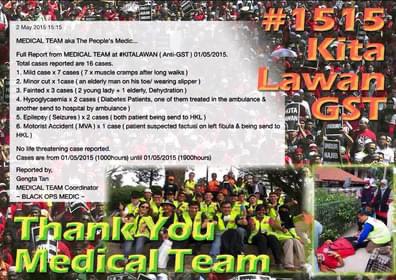
Social media post of medical cases attended to during an anti-GST protest in 2015.
You described jumping in front to shield someone. Do you remember in the 30 plus protests leading up to BERSIH, were there any incidents where you had to do something like that but it was never noticed?
It’s never noticed because I look at the person and it’s like five to six people against one. Of course the one [does not] carry any weapon. [There was this] young guy, if he had continued to be beaten or bullied, I thought he would be traumatised and he would be in very bad shape. So I have no choice, I have to do the kind of heroism at the time to jump into him, to cover him up and to make sure that he’s alright. The only part that I need to cover is the victim’s head because you can see a lot of kicking, a lot of pushing, so it’s really bad. And this guy is actually stopping all the attacks on the body but not protecting his head. For me, I came with proper protection so I jump, I protect the upper body and also the head of the patient, and I ask them to stop. Then eventually after that, they stopped.
After that, they arrest the protesters in the area. Then I say I need to follow. They ask me to identify who am I. I tell them that I’m from this and they can see from my sign and my tag [that] I’m a medical guy. When I go to the protest area, I can see oh my god because during BERSIH 3, once you get arrested, it’s more than 100 over people. I talked to the ACP (Assistant Commissioner Police) at the time and asked if my medical team could come in for random first aid. At first he said no, then I say but you can see you have a protester bleeding from his forehead so I need to have a random check. I promise you I will not do anything stupid, just have to do a random check. You can ask your officer to come and follow us, we just want to make sure they are okay. You can arrest them, but we just want to do our random first aid check. After some discussions [went] on with the ACP, then only he allowed me to bring my team. But he only allowed me to bring four of my medic, so I brought four of my doctors to go inside the area. At the time, I can tell you all my doctors are afraid to be recognised. Everyone came with a cap, black glasses and mask because they don’t want to be recognised. After going inside, two of my doctors didn’t feel comfortable because the police started tailgating them, asking them questions, things like that. They were afraid about their APC (Annual Practising Certificate) licence being reported to the government. Before I brought them into the incident, I told them you have to remain silent. Don’t say anything, don’t mention which hospital, just say hospital from Malaysia or hospital from KL. That’s all. No hospital name has to be involved, you only bring your IC, no credit card, nothing. Just bring some cash. So they did whatever I mentioned. We go there as a medic, not as a protester. We just want to render our help to the public. That’s our standpoint.
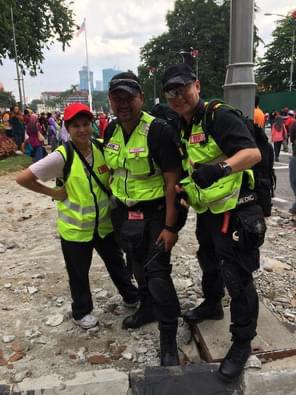
Gengta and other members of the medical team in full paramedic gear.
I want to get a bit about the kind of role you were given because it sounds like by BERSIH 3, they let you lead a medical team. Who contacted you to lead?
The person who [got me] involved is actually from BERSIH 2. I [initially] came out as a medic [independently], then people saw how I saved [someone] in this Malay community [during] the whole BERSIH 2 incident. The doctor [who got me involved] is from PAS at the time and after that, he [had] been involved in Amanah. This doctor, he also came as a medic but he didn’t have a proper reflector t-shirt or anything to indicate that he’s a medic. But he looked at me like oh, I’m actually very well prepared because I came with the vest and all. So this guy comes and approaches me, he says I’m Dr so and so, and says wow, you come very well prepared. Then he said if I’m not mistaken, you’re from white medic right? Then I say yes I’m from white medic, but now I’m not white medic. I represent my own. So from there, we got connected. And then another person that I connected with is Dr [Ahmad] Farouk [Musa] from BERSIH. He is actually a surgeon. I do not know how he got my contact, but he can get my contact because he has been in the medical [field] for quite some time. So he rang me up and asked can I meet you for some tea? I want to know more about your involvement.
So that time, we gathered together as a different party. We have people from PAS, then we have people from MCA, then individual medics, everyone joined together. During BERSIH is the first [time] that everyone [got to] know each other but we haven’t really formed as a team. Farouk spoke to me after BERSIH 2, and after BERSIH 2, there are a lot of things going on so we know that BERSIH 3 will be coming very soon. So we are much more prepared. I think Dr Farouk knew that I’m a guy who is very well known on the strategy and on the field, so he also got me involved in planning. At the time, I was not the lead person. I was just a normal member.
Can you tell me who was leading above you?
I would say Dr Farouk was the main person. But as you know, Dr Farouk is in a wheelchair. He couldn’t really be involved in the field, but he was always our person behind the setting up, connecting with all the people, so this is one of the initial parts. Then after that, we have a Christianity group from church who [reached out] like I’m a doctor, I’m a nurse, so there’s a few more doctors coming into the field. But as a doctor, they train as a doctor. They will have no paramedic experience and exposure. So these were things like I don’t care who you are although you are the surgeon, you are the specialist, but you are not medically trained so we have to lead. When everyone agreed [on me leading], then I [got] to lead. So that is the time we have to plan for BERSIH 3.
I had a lot of ideas [to share], so they asked me to become the leader for one of the platoons. At the time, it’s called ground zero. Medic seven is the code name for me. We have HQ which is hosted by the person [who is] static in the hotel, he will do the coordinator things. We have medic one, two, three, four, five, six, seven until medic eight and I’m the leader of medic seven. These eight people are leaders and there are more people under each. And I’m the only non-doctor to lead the doctors, the rest were all led by surgeons, by specialists.
If you were to guess the total size including all the leaders, how big was the medical team for BERSIH 3?
For BERSIH 3, we had about 288.
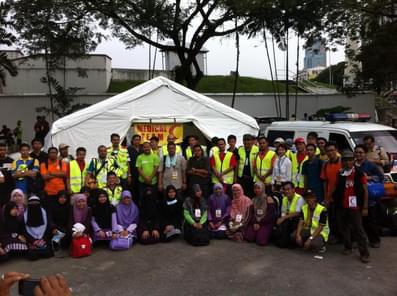
Gengta with the medical team gathered in front of a medical tent and ambulance.
Can you describe a bit about how much training you had to do? Of the 288, were they all paramedics and doctors?
They are mostly doctors and I can say, private hospital doctors. We do have government hospital doctors, but a lot of them have to shield themselves because of the APC licence. APC is the Annual Practice Certificate, so if their certificate’s been revoked, they cannot practise as a doctor so [it’s] very, very dangerous. I have to mention to them I will hold their particulars and everything in [physical form], not even type in my Facebook or anything, so everything will be in hard copy. But as you know, once you hard copy, you cannot keep in your house also. You have to keep it somewhere else because the police might come and raid your house to get your PC or your iPhone, they will get everything. But as long as you keep all those records not in your house, that’s safe.
From what you just described, a lot of them are doctors. So did you have to train them in first aid by a paramedic?
Not really on first aid because I can tell you that during BERSIH 3, it was a very, very odd situation because you as a paramedic, you think you are better than me as a surgeon? I [have been a] surgeon for more than 30 over years, I have been operating patients for more than multiple years and what makes you [think you can] give me instructions? Then we have also for example paediatricians, we have also a group of ENT doctors, oncology doctors, we have all sorts of doctors. But I would say the best doctors involved are actually doctors from the emergency department and from orthopaedic departments. They are the doctors who have [been] involved in these kinds of situations. Sometimes, I will say this: doctors are not good at CPR because [their job] is too hectic for them to perform CPR. CPR, you need some strength, you need some consistency because after one round of CPR, you get exhausted. You must know what’s the timing for you to render a CPR. So we have senior doctors but you can see a lot of them, what they want is [recognition]. They want to lead, but they don’t know how to lead.
So how did you handle that situation?
At the time, I spoke to five doctors. Two doctors will be politically involved. One is Dr Farouk and one doctor is like a missionary doctor—he’s a doctor from a private hospital and he’s a big gun—and myself. So I’m the junior one and not like those gung ho people, but they know that I’m involved in a lot of street medicine and assemblies. We have a mutual table talk and agree that we are not here to let people know who is the best. We are here to help the people.
But after some time, after they listened to what we tried to say, many doctors begin to respect the other team members. After that, we shared our strategies and the doctors were so amazed with what we did because we had everything as a floor plan. How to run, how to escape, how to go to the nearest hospital, where are the nearest clinics, where are the nearest hydration areas that you can hide patients or to shelter them. They were amazed that we as a paramedic did a lot of this groundwork. For them, they can bring our map but they cannot read how to use our map to look at the fastest way to go to the hospital because even though you have an ambulance, your ambulance cannot move at all because you have more than thousands of participants on the road. Even if you turn on your sirens, your ambulance still cannot move. By foot is the fastest. If we are in ground zero which is Dataran Merdeka, the nearest hospital is always Tung Shin Hospital, then after that HKL, HUKM. The rest are the small, small medical centres like the maternity hospitals in Pudu area that you can use. So we actually connect with all these [places] to make sure that we [have] easy access to their clinic and medical centre.
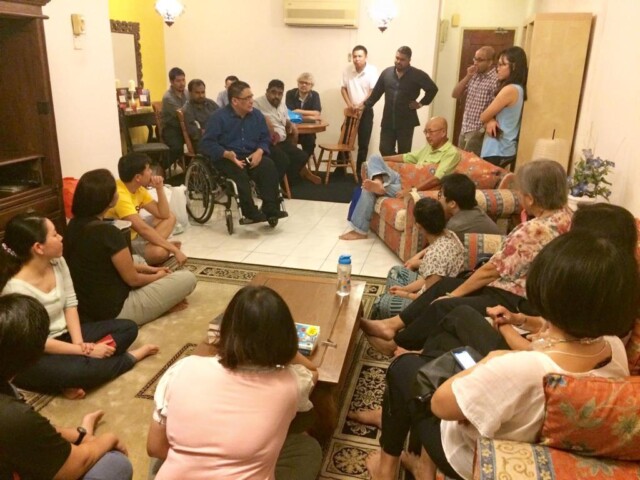
Members of the medical team meeting at a house for training and planning.
You still have to do a briefing or some kind of training, right? What resources did you have and who provided these resources in terms of the venue, getting people’s time, maybe providing food and beverage? We are curious about what kind of resources it takes to mobilise a protest because people think it’s easy. People think you call white medic and they will be there and you can have so many doctors, but we want to get a sense of how much work you put into it and what kind of preparation that people really don’t see when they go for protests.
I think you make the right point that sparked in me also but some of the names, you have to keep PNC. Mostly, they are doctors, surgeons. They are rich, they have big houses. One of the doctors stayed in a gated, guarded residence in Kuala Lumpur. We would go to the doctor’s house and have the meetings in the house. After some time, our doctors, paramedics and nurses team became bigger and bigger. There was a time [when] we had to host about 120 doctors [at the same time] so we said doctor, I think your house is too small to gather everyone here. Then it’s like okay, let me call the residence community. Once he picked up the phone, he called. And because he’s a very popular doctor in Klang Valley, they said okay, you can use the community hall. So we used the hall for our meetings and training.
[In the] paramedics field, [it is] not only random first aid. We have to know how to carry a person, we have to know how to use a walkie talkie as communication. You will have a very silly doctor who picks up a walkie talkie and he start away to speak hey, send me an ambulance. He really does not know how to use the walkie talkie [because] you have to push the top button and you have to repeat twice in every sentence that you mention. You always have to speak slowly, loud and clear, but a lot of times they will speak in medical terms. So it’s like yes, you are right but nobody is going to hear you because you do not know how to operate a walkie talkie. So we also will have walkie talkie training, escorting training, then we will have basic medical training conducted by doctors. For example, the doctors will teach you what’s the fastest way to handle dehydration, stroke, cardiac arrests or even some of the allergic reactions. We have to have this kind of medical knowledge.
We also have a lot of good people [who] come in with donations to purchase medical supplies and essential things like gauze, bandages, some of the inhalers for asthmatic patients. We seldom have oral medication but we have important ones like nebulizers for asthma, then we have ORS (oral rehydration solution) for dehydration to replenish the fluid in their body. We will also [learn] if tear gas hits the eyes, how are you going to clear it as soon as possible. We will have Melox mixed into the water and put in as a spray just to neutralise the chemicals. So we teach how to do this kind of thing as well and all the medics are well-trained. And myself, I [provide] training mostly on walkie talkie and also the route to escape and send the patients to the hospital on time. I would say the timing that we send patients from point A to the hospital is very, very fast. Before we had Grab drivers, we had all our motorbike friends [on] standby in certain corners just to help us to bring the patients to hospital. The fastest way for us to bring is not by ambulance, it’s by motorbike. I think we had nearly 50 over bikes always on standby. They are also parked under medic.
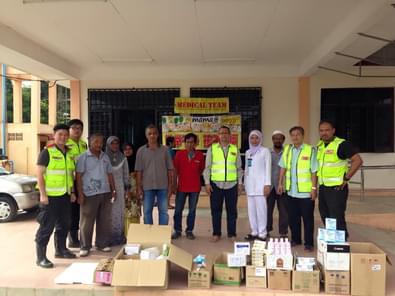
Gengta and members of the team receiving medical supplies.
For each paramedic, at the lowest level, how many hours of training would this person receive roughly in preparation for BERSIH?
I would say roughly, we will spend about 10 hours at minimum. Normally, what we do is we will train mostly the young generation. The older generation, they are stubborn. Because as I told you, [some of them] are surgeons with 30 over years [of experience]. You don’t ask me to do this kind of thing, it’s not my job. So okay, respect them as a surgeon. As long as they want to help, that’s okay. But one thing is they are not fit to run, they are not fit to random [first aid], so they will be static at one point. It’s fair enough. Make sure if they cannot [do] physical [work] on the spot, [put] them into the ambulance. As long as they’re in the ambulance, they [can provide] random help also. So you will make sure that each person has a different role to play. On foot are always the paramedics who lead the ground.
That gives us a rough picture of the kind of resources you need. So things like travel and food, did you have to handle yourself or did BERSIH come in with some money?
No, BERSIH didn’t come in [with] a single penny. No money at all. It was self-mobilised, self-sustained. To be honest with you, we have a lot of good doctors [who] are wealthy. As I mentioned to you, they are surgeons, they are specialists. This round, I will pay for all the makan, I will pay for all the things. Sometimes we have to be at the [protest site] one day early so we will book [an] place that allows us to rest, shower and use the toiletries. We will book three to four rooms, [either] same hotel or different areas just for us to go in and have a rest. Because if you still remember, BERSIH 4 is something like 48 hours on call so you cannot be on foot most of the time, so we have a few places for us to rest and to go to the toilet and things like that. Those financial [support] is actually from our friendly doctors, or sometimes we have a very good person [who] suddenly got my number. Gengta, I want to help you with the sponsor of RM2,000. Just do whatever you think is right to do and spend it wisely. But every time I spend it, I will come back with the receipt to them to prove that this is the money that I have spent. But mostly, I will say I will purchase medical essentials, first aid kids, all this medication stuff and I will show them back, this is the receipt that I have purchased.

Gengta and the medical team attending to a patient at a nearby bus stop.
You’ve given us a good picture about the logistics and what it was like on the ground. Can you reflect a bit about the legacy of protests or the effect of protests, given your involvement and how you are motivated by this sense of injustice? Do you feel that protests have been effective in advancing what you believe in and your cause?
When you do these kinds of assemblies, you’re actually giving the Parliament a picture of how they’re gonna fight in the next Parliamentary [session and what it is that they need to address]. People come to protest not because they get paid to protest, it’s just that they feel it’s unfair. That’s why they come out to protest. When they come out to protest, their mind is very clear. I want to make sure that we have fairness. The first and foremost thing is the education system. Education has always been the number one thing that [needs to be addressed]. The Ahli Parlimen is the person [who] they have to make sure [knows that] this is the voice from the people on the ground. Once we have put you on top as a representative of the people, we can also bring you down anytime as we want. So make sure that everyone has their role to play. This is the thing that we learned. And BERSIH really impacted a lot, especially the time we wanted to bring down Najib and we successfully brought down Najib.
So you see protest as a kind of check and balance, and also to convey to both government and opposition or whoever you elect to bring your message to the Parliament, within the halls of power?
Yes, that’s correct. Because we cannot suka-suka go for assembly like that because it’s a waste of time and a waste of effort. You might get injured also. So we have to come [with] a purpose [of] why you need to be involved, what is your main objective, is there any message you want to bring? That is the thing that we want to [tell] the next generation. If you go to protest, you must think [about] what are the [issues] that you want to bring. You cannot go [simply to just go and protest]. Like last time, some of the parties give RM50 to one person then go and become provokasi, become mat rempit and things like that. But I think [the parties] also learned their lessons. They learned their very, very hard and painful lessons during the elections because they lost a lot of seats. And you can see that those people who are working very hard to bring justice, they actually have [the people’s] trust.
Do you think BERSIH was effective in achieving what it wanted to achieve? Because it’s not just about Najib, there’s also election reforms.
Like you have to put the dye in your fingers to make sure you cannot vote two times or things like that? Yeah, I think it also impacted future elections and even future MPs, what they need to do, what they can do and what they can’t do. So I consider it very, very effective.
What do you think makes a protest effective or not effective? Is it the size, is it what it champions?
You must have a champion who knows what they are going to bring next. Then, you mustn’t come in as a big group without any motive. You must be very specific on what is your aim. Like last time, our aim is to bring down Najib, and we brought down Najib. Our aim is to achieve justice, and we achieved justice. So what you champion is very, very important.
